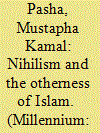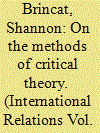| Srl | Item |
| 1 |
ID:
124626


|
|
|
|
|
| Publication |
2013.
|
| Summary/Abstract |
The 'death of God' remains a recognisable frame to approach Western cultural malaise captured in its nihilism. Removed from this spatio-temporal horizon, however, claims of fin de siècle appear partial, provincial, and extraneous. For worlds 'outside' the West, the idea of the death of God is an absurdity, excessive and irrelevant. Viewed from relativist positionality, God's demise presents as a strictly Western problem. On the other hand, nihilism is neither a culturally restricted state nor a unique property of Western self-annihilating proclivities. This paper explores the assumed 'Otherness' of Islam in its encounter with nihilism, especially in reference to the question of political violence. Distinction between life-affirming and life-negating impulses of political violence helps situate religiously coded violence and the nihilistic violence of modernity. In the case of Islamic violence, it is argued, this distinction is often blurred. The paper maps out the cosmological basis of Islamic alterity, one that is increasingly tested under conditions of globalising modernity and its pathologies.
|
|
|
|
|
|
|
|
|
|
|
|
|
|
|
|
| 2 |
ID:
113818


|
|
|
|
|
| Publication |
2012.
|
| Summary/Abstract |
This article offers a reconstruction of the methodological tools pioneered by the first generation of the Frankfurt School (FS) and how they have been adapted in the contemporary project of emancipation in Critical International Relations Theory (CIRT). It is argued that the praxeological and methodological commitments of the early FS are of continuing utility in the post-positivist turn in IR theory. The paper also argues that CIRT has made significant advances on the original programme of CT developed by Horkheimer in the early 1930s. In particular, it is contended that the alleged pessimism typically associated with the later work of the early FS can be overcome if critical analysis looks beyond the state to those possibilities of emancipation pregnant within the global processes of world politics. Here the work of CIRT is argued to offer a number of advances on the sociology of the early FS, which was problematically confined to the examination of Euro- and state-centric possibilities for emancipation.
|
|
|
|
|
|
|
|
|
|
|
|
|
|
|
|